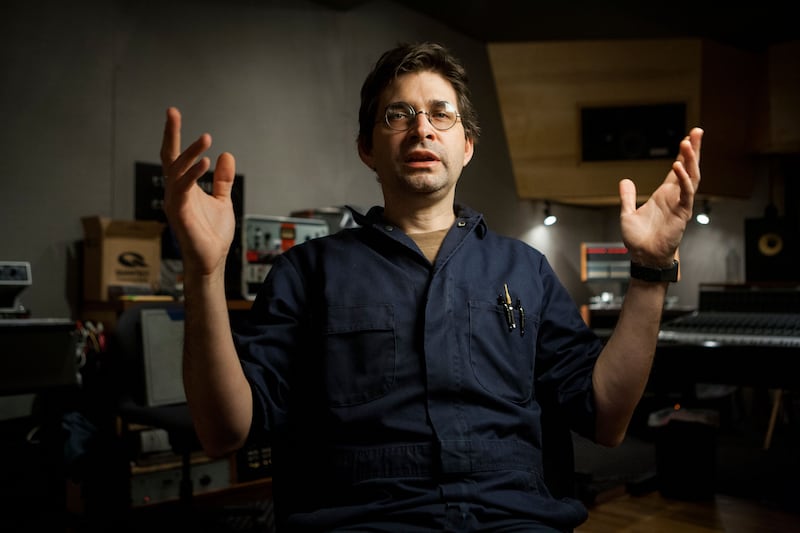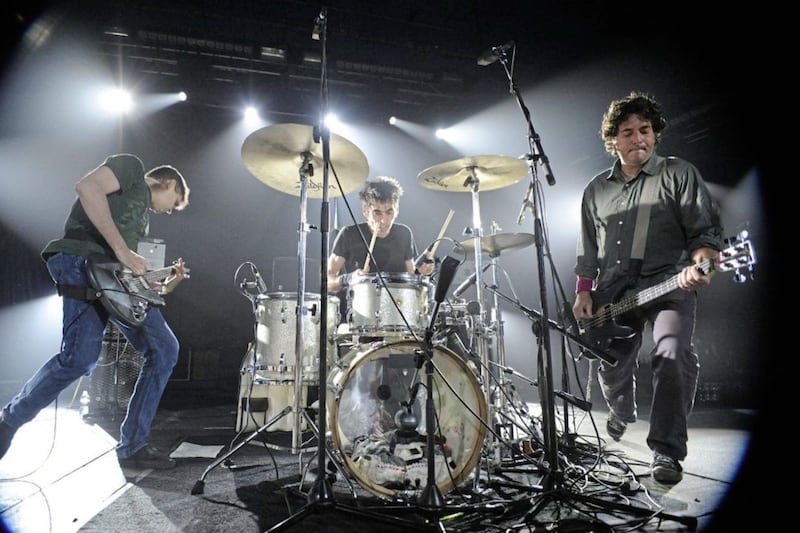STEVE Albini should need no introduction to regular readers of this column, but here’s a few ‘trigger words’ related to this esteemed musician / recording engineer to help coax those still feeling the effects of last night’s meths back to cognisance: Big Black, Rapeman, Shellac, Surfer Rosa, Tweez, Pod, Goat, Seamonsters, Rid of Me, In Utero, After Murder Park, Chicago, Electrical Audio, analogue.
Mr Albini will shortly be taking a break from recording bands to magnetic tape at his world-renowned Electrical Audio studio in Chicago to speak at the Output Belfast music conference at The MAC on February 18.
"I've actually been given a fairly free hand, which is both nice and a little bit daunting," reveals Albini of his 'brief' for the event.
"It's nice that I don't have to satisfy some sort of external requirement, but daunting in that anyone who's at a music conference is going to be someone who has thought deeply about music.
"And so anything that anyone else says about music is going to be scrutinised. So it sort of puts me on the spot."
He should be well used to this by now. The California-born, Montana-raised, Chicago-based music man has long been one of the few figures in alt and punk circles whose every interview and online comment becomes fodder for discussion.
Albini's deliciously barbed 1993 essay The Problem With Music, in which he compared the major label 'experience' to crawling though "a trench filled with runny, decaying s***", offered a sobering financial breakdown of the average major record deal and concluded "some of your friends are probably already this f*****", might be one of the the late 20th century's most quoted bits of music writing.
Tellingly, its accuracy has rarely been disputed over the past two decades in which that foul trench has been decimated by the arrival of internet file sharing.
"My love of music started with me being a fan but the practise of music from me as a band member has sort of insinuated me into the community of musicians," comments Albini on his particular perspective.
"I also run a recording studio that serves that community, so I have a business association with music as well. But it's an outgrowth rather than my primary relationship.
"I'm much less concerned about business than people who make a living exploiting music as promoters, club owners, record label people and so on. If there are 'teams' playing in this game, that's not 'my team'.
"While I'm very steeped in the culture of working musicians, a lot of the people listening to me will not be.
"So, I guess that the most useful I can be is to wake those people up to what is going on inside the culture of musicians in a kind of an anthropological sense: how the current music climate affects us as working musicians and what people's participation in it means to us."
Despite his championing of 'old-school' recording practises and formats, Albini is no Luddite when it comes to appreciating the positive aspects of the internet age in relation to the creation and distribution of independent music.
"I'm 53-years-old, which puts me squarely in the group who are by and large much more grumpy about the internet and its influence on music," he says.
"But, thanks to being embedded in the community of musicians, I get to see the effects of internet distribution on bands just starting out and learning the ropes. They're engaging with it in a way that makes it a primary part of their relationship with their audience and I find that quite satisfying and heartening.
"I also admire the perspective that bands who have come of age during this era have managed to maintain, because it proves how flexible and adaptable music is as a past-time and an occupation.
"You can take onboard all these new aspects of the culture and incorporate them into your practice, and it can be a quite painless exercise.
"Where the pain and complaint comes in is people who refuse to adapt and refuse to appreciate the advances in technology and culture that have enabled so much that was impossible or very difficult previously."
The interweb is all well and good as far as it goes – yet, despite years of doom-mongering in the digital download dominated age, physical formats are actually enjoying something of a revival.
Vinyl sales are booming and even the humble cassette – declared 'dead' as a format somewhere around the turn of the century – is staging a comeback in DIY and underground circles.
"I find that novel and slightly charming," admits Albini of the latter, rather baffling development.
"Even though they have all of the drawbacks and none of the advantages of other analogue formats, the fact that a 'cassette culture' was able to be created at this late stage shows how flexible and resourceful people involved in music can be.
"As a social experiment of making and distributing physical copies on the cheap, I think that's kind of remarkable. If you talk to people who are engaged with that culture, the principle thing that they like about it is the facility of it – anyone can make and distribute them as a physical artefact of their band.
"There's nothing 'ironic' or cynical about that."
While Albini's band Shellac are all about the format from which they derived their name, they aren't vinyl Nazis.
Back in 2000, their 1,000 Hurts LP came bundled with a free CD copy – a move pretty much unheard of at the time and which predicted today's 'free download code included' vinyl culture.
Now, vinyl is back with a vengeance – a Very Good Thing as far as Albini can see.
"The bulk work of record pressing plants worldwide is now independent labels and independent bands pressing their own records, which is an astonishing, remarkable and truly great development," he tells me.
"That means that the long-term life of music is no longer principally in the hands of corporate interests whose relationship with music is one of exploitation – it's now in the hands of people who are actively doing it for their own and other people's benefit."
Hear hear. If you enjoyed reading that, be sure to sign up for some live Albini oration in Belfast next Thursday.









